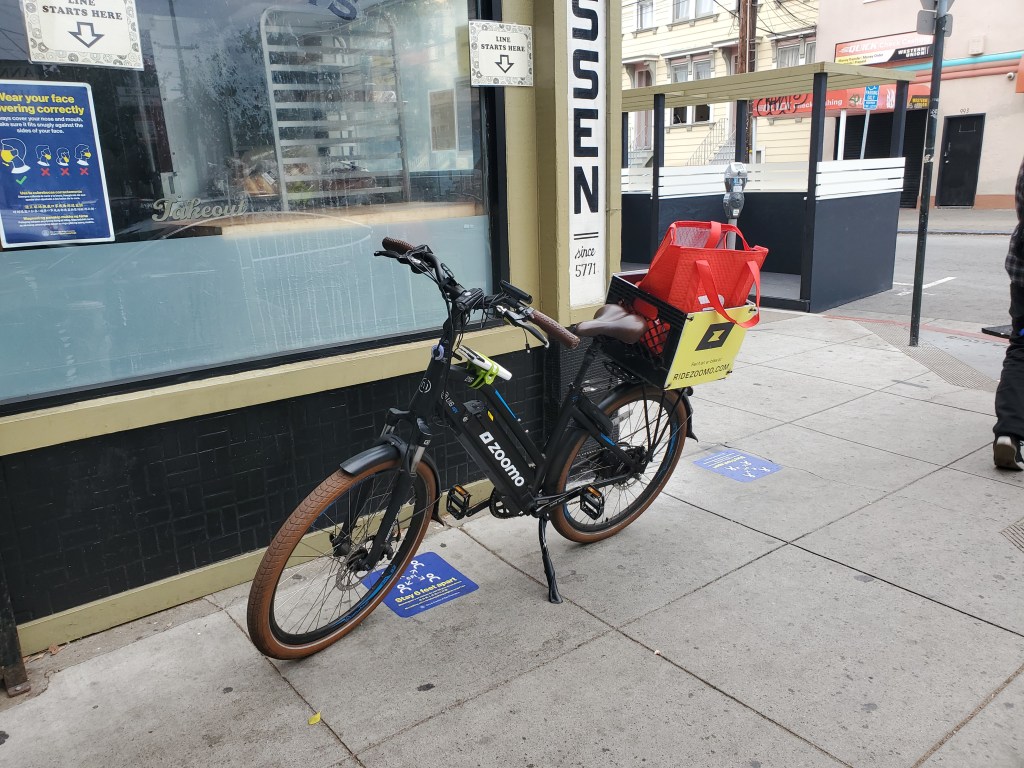Having no sales team until this year hasn’t stopped Zoomo.
Key Takeaways
- Founders Mina Nada and Michael Johnson
- $108 million raised last financial year is being spent on software development and bringing their newest model, the Zoomo One, into production
- 400 employees across Canada, the US, UK, France, Germany, Spain and Australia

Mina Nada was Deliveroo’s first employee in Australia. He came on board in 2015 to run the Sydney operation for what was then a small British start-up food delivery service.
He had a blast. They experienced tremendous growth as Australia welcomed this brave new world of food.
He noticed something in the data he hadn’t expected – that the fastest delivery drivers were not the motorbikes or mopeds, but the cyclists. They didn’t have to worry about finding parking spots at either end – up on the footpath and to the front door.
But he also noticed that cyclists in his hilly hometown were slower than those on the river flats of London and Paris. That was a problem that needed solving.
In those days, the data didn’t separate bicycles from e-bikes but he knew from talking to the riders that the few e-bikes they had back in 2015 were killing it.
He transferred to Singapore with Deliveroo and ended up leaving them to join the Chinese dockless bikeshare company, Mobike, managing a fleet of 100,000 rent-by-app e-bikes.
“At Mobike, they design and engineer the vehicles. They were all connected. They had a software system for maintaining them and connecting them. They had their own maintenance people on the ground.” Mobike weren’t thinking about the commercial delivery potential of such vertical systems – but Nada was.
“The US and UK took off. 2020 was a big year for the business even though it wasn’t a good year for Australia. Now, 90% of our revenue is generated outside of Australia.”
– Mina Nada, co-founder of Zoomo
“The experience at Deliveroo showed me that no electric bike on the market was fit for commercial use,” recalls Nada.
In 2017, he got one of his former colleagues from Bain and Co, Michael Johnson, to join him on this idea and go looking for anybody filling this niche. “We scoured the globe. (Delivery riders) were working eight-hours so they needed bigger batteries than private customers. Some were doing 50,000km per annum. They needed a very robust vehicle. They ride at night and in the rain. So safety is a bigger deal. Customers need fleets. You need them to be GPS tracked.
“The second insight was that servicing operations don’t exist. If you want to maintain thousands of electric bikes, you can’t get it done at the local bike shop. So, we realised we had to do that ourselves. ‘No-one’s doing this. We know there’s a space for it.’ And that’s how we got the confidence to go out and give it a shot.
After two years of getting prepared, they quit their jobs, raised $2.5 million and hired their first employee in 2019. The design and engineering were done in Australia with the bikes made on contract in Taiwan.
The first customers were gig workers for Uber Eats, Doordash and Deliveroo on short-term leases. “We had to prove ourselves to the individual couriers and make sure we made a product they loved. You couldn’t gold-plate anything. You had to nail the proposition.”
They had expanded overseas in 2020. “We didn’t know if it would be more successful in the US or UK so we took a crack and launched in San Francisco and London. It ended up being a really good move because when Covid struck, the Australian business came under a lot of pressure.” All the student and backpacker drivers had gone home. “On the other hand. The US and UK took off. 2020 was a big year for the business even though it wasn’t a good year for Australia. Now, 90% of our revenue is generated outside of Australia.”
In 2021, the business flipped to being mostly long-term fleet leases to companies. “A lot of the reason we won that business is that the couriers who worked for them loved our vehicles and felt safe and they were powerful and comfortable.
“The really cool thing is that we didn’t have a sales team till this year,” says Nada. “It was very much through referrals. Going to Spain was us responding to a customer from the UK who said we were better than their supplier in Spain. A lot of our expansion has been like that. Word spreads from one part of a multinational company to another.”
Today, they have 400 employees across Canada, the US, UK, France, Germany, Spain and Australia.
The $108 million raised last financial year is being spent on software development and bringing their newest model, the Zoomo One, into production. The so-called “moped killer” will have a top speed of 45km/h which they claim makes it the fastest purpose-built delivery bike in the world, and which also makes it illegal in Australia. It is, however, okay to sell in the US and Europe.
“It’s been really nice to hit a nerve with people,” says Nada. “They’re getting something they can’t get anywhere else. It helps them be faster, safer, better for the environment. They’re trusting us.”